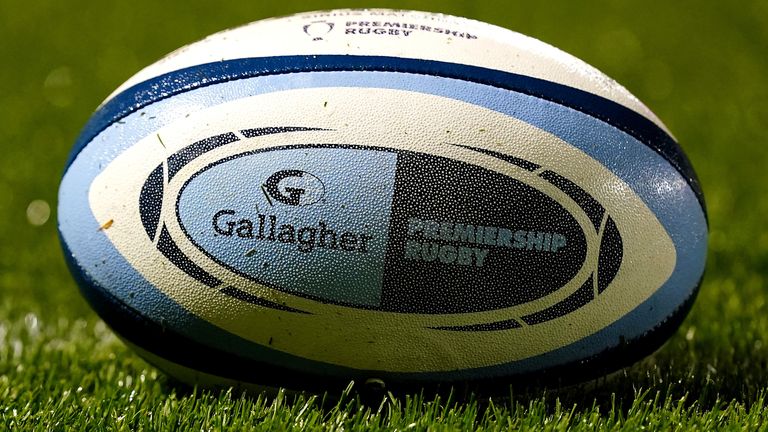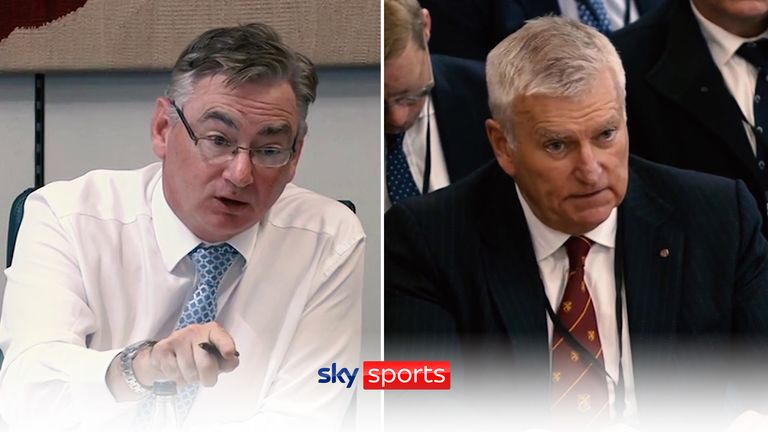Amid annual losses averaging £4m per Premiership club, DCMS committee said: “The demise during the season of two Premiership clubs is a stain on the reputation of the RFU and PRL. It is not indicative of a healthy professional set-up. The financial situation is clearly unsustainable”
Last Updated: 16/01/23 11:26pm

MPs have issued a damning report on ‘unsustainable’ Premiership club finances
MPs have warned the financial situation of Gallagher Premiership clubs is “clearly unsustainable” in a damning report on issues facing the professional game in England.
The demise of former top-flight clubs Wasps and Worcester earlier this season has been described as a “stain on the reputation” of the Rugby Football Union and Premiership Rugby.
The Digital, Culture, Media and Sport (DCMS) committee said RFU chief executive Bill Sweeney and his Premiership Rugby counterpart Simon Massie-Taylor held a “very complacent belief” that plans to increase revenues and improve collaboration would solve existing financial problems amid annual losses averaging around £4m per club.
Sweeney and Massie-Taylor appeared in front of the select committee in November after Wasps and Worcester had entered administration – a fate which resulted in both clubs losing their Premiership status amid many job losses.
The committee concluded that poor oversight from rugby union’s governing bodies contributed to Wasps and Worcester collapsing, and criticised “a lack of safeguards in place at the highest levels of the game” to help prevent such issues.
“At Wasps, a disastrous and ill-thought-through relocation to Coventry, and the debt incurred to fund this, crippled the club financially,” the report read.
“At Worcester Warriors, unscrupulous owners mismanaged club finances while attempting to strip the club of its assets. One of the most striking facets of the problems at Worcester Warriors was the lack of due diligence undertaken regarding its owners, particularly Colin Goldring.”
The committee’s conclusions and recommendations include that when the RFU publishes its next annual report, the governing body writes to the committee with “a detailed commentary of its financial position and what steps it will be taking to prevent further clubs collapsing”.
The committee added: “The demise during the playing season of two Premiership clubs is a stain on the reputation of the RFU and PRL. It is not indicative of a healthy professional set-up.

Worcester Warriors and Wasps went into administration and suffered relegation within weeks
“We welcome the planned reforms to prevent similar occurrences in the future, but such alarming circumstances should not have been required in order for the RFU and PRL to realise the necessity of these reforms.
“The financial situation of Premiership clubs is clearly unsustainable, and we are surprised by the very complacent belief of Bill Sweeney and Simon Massie-Taylor that further growth in club revenues will solve these problems.”
On player welfare, MPs say the introduction of a benevolent fund is a “pressing need”, and that the RFU should adopt measures giving players a stronger say in all matters relating to their welfare.
Damian Green MP, acting chair of the committee, said: “Club rugby at the top of the game is in disarray.
“Inert leadership from the RFU and PRL has allowed mismanagement to collapse two of English rugby’s top teams. Thousands of loyal fans have been deprived of their clubs and hundreds of jobs have been lost.

MP Julian Knight previously accused RFU chief executive Bill Sweeney as being asleep on the job, for failing to keep clubs like Worcester and Wasps alive
“We welcome the raft of changes announced by the PRL and RFU. Better safeguards and a stronger owners’ and directors’ test are desperately needed. But it’s incredibly disappointing that two clubs had to collapse for the rugby governing bodies to act.
“More worryingly, the root of the problem remains. Rugby clubs are still spiralling into debt and the RFU and PRL’s current revenue-boosting plans haven’t done enough in the past and are unlikely to make a difference going forward.
“With its upcoming annual report, the RFU must demonstrate to the committee how it will protect the rest of the league from financial ruin.”
In response to the committee’s report, the RFU and Premiership Rugby issued a joint statement.
“Professional rugby clubs are independent, individually managed businesses,” they said.
“However, it’s clear that the pandemic and economic environment has further exposed the fragility in the professional system. Together, we are working hard to address these issues and create a sustainable league.
“Whilst commercial growth will be important, there is equally a major focus on financial monitoring and management, as well as improving governance and some of the other foundational elements which are important to attract future investment in the club game.
“Plans are already in place for a financial monitoring panel where we are conducting a third-party financial review of all clubs and will aim to announce an independent chair in due course.
“Player welfare is an absolute priority for all rugby stakeholders, and players are represented on the Professional Game Board, the RFU Council and player welfare committees.”
